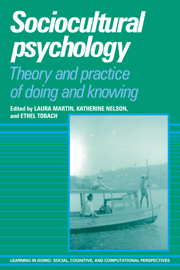Book contents
- Frontmatter
- Contents
- Series foreword
- Preface
- Contributors
- 1 Introduction
- Part I History and culture
- Part II Doing psychology
- 5 Opening vistas for cognitive psychology
- 6 Analysis of developmental processes in sociocultural activity
- 7 Linking thought and setting in the study of workplace learning
- 8 Cultural–historical psychology: A meso-genetic approach
- 9 The abstract and the concrete
- 10 From spontaneous to scientific concepts: Continuities and discontinuities from childhood to adulthood
- 11 The psychology of Japanese literacy: Expanding “the practice account”
- 12 Voices of thinking and speaking
- Part IV Activity in work and school
- Index
9 - The abstract and the concrete
Published online by Cambridge University Press: 05 November 2011
- Frontmatter
- Contents
- Series foreword
- Preface
- Contributors
- 1 Introduction
- Part I History and culture
- Part II Doing psychology
- 5 Opening vistas for cognitive psychology
- 6 Analysis of developmental processes in sociocultural activity
- 7 Linking thought and setting in the study of workplace learning
- 8 Cultural–historical psychology: A meso-genetic approach
- 9 The abstract and the concrete
- 10 From spontaneous to scientific concepts: Continuities and discontinuities from childhood to adulthood
- 11 The psychology of Japanese literacy: Expanding “the practice account”
- 12 Voices of thinking and speaking
- Part IV Activity in work and school
- Index
Summary
Despite fundamental differences in foundations between activity theory and dialectical logic on the one hand, and mentalistic cognitive science on the other, some particular substantive concerns within these perspectives have points of contact with one another. One such question, the focus of this chapter, has to do with the distinction and the relations between the abstract and the concrete.
Although the analytical categories of abstract and concrete span a range of content areas, this chapter will center on thinking and inference. I will examine some current discussions of the role of abstract/formal processes and contentful/situated processes in language and inference, grounded in the mentalist cognitive framework, and juxtapose these discussions with analyses of abstract and concrete forms of thinking provided within dialectical logic and activity theory. Within their respective aims, both these frameworks have needed to posit and to define distinct modes of thinking and to investigate theoretically the relationship between the two.
The question of the relations between the abstract and the concrete is configured by the conceptual framework of each theory and driven each time by theory–internal problematics. Concepts are never defined in isolation, but rather derive their meaning from their relations to other concepts within a coherent theoretical system (e.g., Wiser, in press). Of necessity, this imposes constraints on the comparability of concepts across theories. Despite those constraints, it is the aim of this chapter to probe the points of contact, of mutual resonance, and of opposition between the two kinds of theoretical descriptions of abstract and concrete phenomena, and to examine how these oppositions are imposed by differences in foundation between the two frameworks.
- Type
- Chapter
- Information
- Sociocultural PsychologyTheory and Practice of Doing and Knowing, pp. 205 - 228Publisher: Cambridge University PressPrint publication year: 1995
- 8
- Cited by



